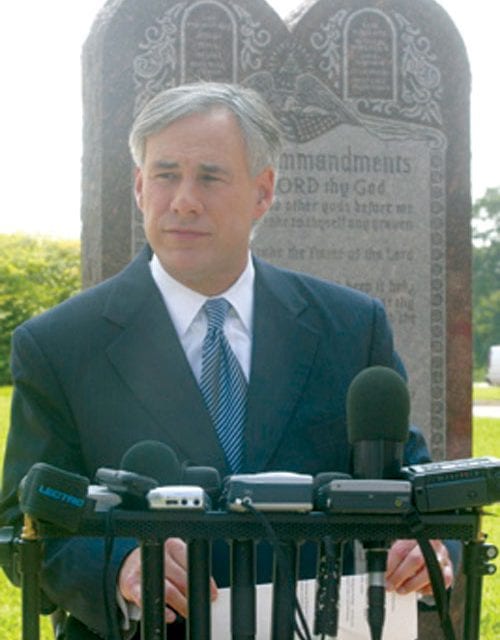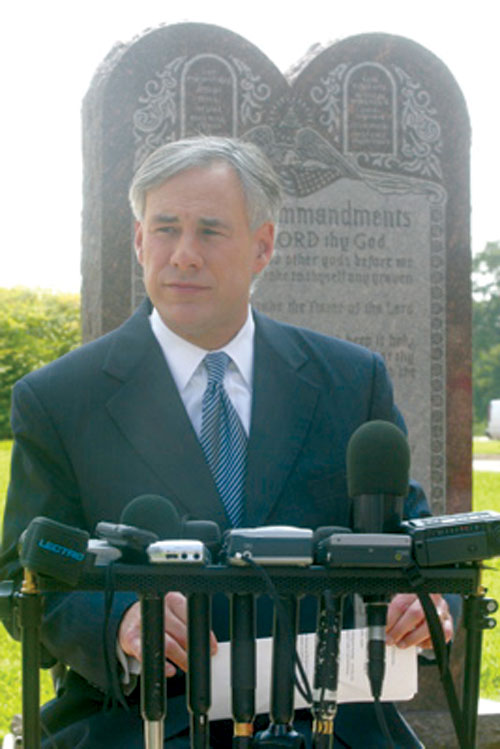Texas AG responds to passage of nondiscrimination ordinance in San Antonio, but it’s unclear if laws in Dallas, Fort Worth will be included
If the city of Dallas has to defend its local nondiscrimination ordinance against a lawsuit brought by Attorney General Greg Abbott, Councilman Philip Kingston said he’s only one voice in 15, but thinks there’s strong support for it among council members.
“I would hope he wouldn’t waste public funds on such a quixotic pursuit,” Kingston said, “but if he does, bring it on.”
Kingston, an attorney, said a nondiscrimination ordinance doesn’t conflict with the First Amendment as Abbott claims and the First Amendment doesn’t give you a right to discriminate based on religious freedom.
After San Antonio passed a nondiscrimination ordinance that extended protection based on veteran’s status, sexual orientation and gender identity, Abbott told radio station 1200 WOAI-AM he would file a suit to stop it from going into effect.
A spokesman for Abbott’s office declined further comment. When Abbott spoke to San Antonio’s WOAI, he said a suit could come as early as this week.
“There is a provision in here, that seems to silence anyone who may have a disagreement with that ordinance,”
Abbott told the station. “I believe that violates the First Amendment protections of freedom of speech and freedom of religion, and violates the Texas Constitution.”
Abbott wasn’t clear if he would include Dallas and Fort Worth, which both have similar ordinances in place, in a potential lawsuit.
Fort Worth city spokesman Bill Begley said officials haven’t been contacted about any possible inclusion in a lawsuit and couldn’t comment what action his city would take.
But Begley stood behind Fort Worth’s nondiscrimination ordinance.
“We’ve done what we’ve done because it’s in the best interests of our residents,” he said.
Sarah Warbelow, the Human Rights Campaign’s state legislative director, said she knows of just one other instance of an attorney general interfering in a local nondiscrimination ordinance. That was in Arlington, Va.
“Virginia has strong laws about state control across the board,” she said, adding that the state law used to block the local nondiscrimination ordinance has been used to limit the power of local government on a variety of issues.
Warbelow also said Abbott may be confusing state laws banning same-sex marriage with nondiscrimination ordinances. Three states — Colorado, Wisconsin and Nevada — have both bans on same-sex marriage and statewide nondiscrimination laws protecting people based on sexual orientation.
She said courts have consistently found that state laws protecting people based on sexual orientation do not violate protections of religious freedom.
“He’s of the belief that personal religious beliefs can trump state and local nondiscrimination law,” she said. “Thus far, no court has held that to be true.”
Warbelow said that was tested in the 1940s, ’50s and ’60s — when people with businesses claimed civil rights laws infringed on their religious beliefs opposing interracial and interfaith marriages.
More recently, an attack on local nondiscrimination ordinances came from a state Legislature.
After Nashville passed a nondiscrimination ordinance in 2011, the Tennessee Legislature countered by passing a bill outlawing local LGBT protections.
Since then, the state law has been in court and three additional jurisdictions have passed nondiscrimination ordinances — Knoxville and Memphis in 2012 and Knox County, which includes Knoxville, in 2013.
Warbelow said at least half a dozen states have introduced similar attempts to ban local nondiscrimination ordinances, but none has been successful.
Marisa Richmond, secretary of the National Center for Transgender Equality and a lobbyist for the Tennessee Transgender Political Coalition, called the Tennessee bill “a violation of the First Amendment right to petition the government for a redress of grievances.”
Unlike Virginia’s laws dating to the 1860s that limit local power, she called the Tennessee law retrospective, because it passed a month after the Nashville ordinance.
“It impairs the right of all local governments, as well as the people in those communities, to draw up contracts based on taxpayer money,” she said.
The LGBT community lost in the first round in Davidson County Chancery Court. The judge insisted the plaintiffs demonstrate injury.
“Fortunately, the Tennessee Court of Appeals overruled her on that point and ordered her to consider our case,” she said.
Attorneys have filed amended motions and the case awaits another hearing.
For now, Abbott’s threat to file a suit against San Antonio and possibly other cities with nondiscrimination ordinances remains just that — a threat.
Lambda Legal Supervising Senior Staff Attorney Ken Upton said he isn’t sure what basis Abbott would have for a suit.
He said one section of the ordinance relating to bias speech by a public official acting in an official capacity may be a free speech issue. Abbott referred to the Supremacy Clause giving state law precedence over local law, but no state law limits protection of civil rights in housing, employment and public accommodation.
“This attorney general thinks that marriage amendment is his trump card to do anything he wants to the gay community,” Upton said.
When other states have tried to limit progressive localities, they’ve failed. Upton cited Romer v. Evans, a Colorado case that threw out a state constitutional amendment preventing protected status for gays and lesbians because it did not pass the rational basis test.
“I suspect he’ll file something,” Upton said. “It’s part of his running for governor.”
Equality Texas Executive Director Chuck Smith also called Abbott’s threat “pure campaign rhetoric and pandering.”
He noted that Diego Bernal, author of the San Antonio ordinance, is a civil rights attorney and had confidence that should there be a challenge to the law, it will stand up in court.
Arguing for the right to discriminate would be difficult in any court, Smith said.
This article appeared in the Dallas Voice print edition September 13, 2013.


